Hand Conditions We Treat
At FORM Ortho, there are common Hand, Wrist, and Elbow conditions that we treat, but there is no one way to treat a condition. Each therapy program is designed specifically for your condition, needs, and goals in mind. This allows our therapists to provide better outcomes and at times, faster recovery for our patients. If you have a question about whether your condition should be treated by one of our hand therapists, call FORM Ortho at (510) 585-2535.
Nerve Compression Conditions
Carpal Tunnel Syndrome (wrist) and Cubital Tunnel Syndrome (elbow) can cause pain, tingling, numbness and/or muscle weakness affecting upper extremity function. These nerve compression conditions may be treated nonsurgically, but in more severe cases may require surgery and post-surgical therapy. At FORM Ortho, our Hand Therapists provide highly specialized therapeutic interventions for the nonsurgical and post-surgical treatment of nerve compression conditions.
The following are just a few nerve compression conditions we treat. If you have a question about whether your condition should be treated by one of our hand therapists, call FORM Ortho at (510) 585-2535 or ask your doctor for a referral to FORM Ortho. If you are not currently under the care of a physician for your condition or would like to be evaluated by an Orthopedic Surgeon specializing in hand, wrist and elbow conditions, schedule an appointment at FORM Ortho.
- Carpal Tunnel Syndrome
- Cubital Tunnel Syndrome
Carpal Tunnel Syndrome
Carpal Tunnel Syndrome is a condition where the median nerve is compressed as it enters the hand near the base of the palm. Symptoms can be brought on by repetitive or prolonged hand activity.
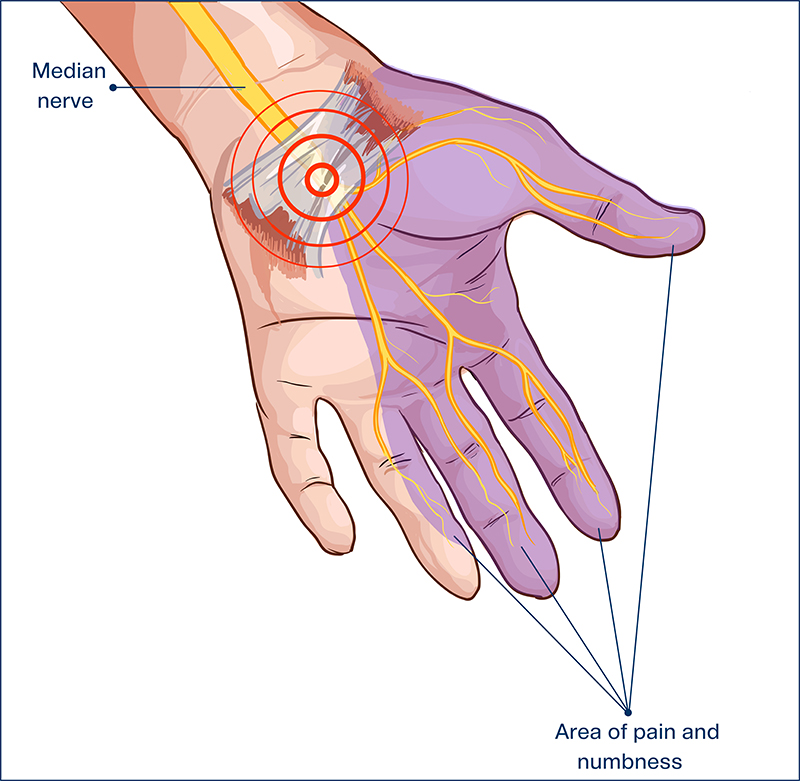
Symptoms
When the nerve is compressed, you may experience symptoms of numbness, tingling, pain, and weakness of the hand.
- Hand numbness or pain at night that can wake you up.
- Numbness when you first wake up in the morning.
- Symptoms may be intermittent or constant based on the severity of your condition.
Nonsurgical Treatment
If you are referred to FORM Ortho for the treatment of carpal tunnel syndrome, our hand therapists can help reduce your symptoms and prevent future carpal tunnel syndrome occurrences. Once the cause of your carpal tunnel syndrome is determined, your hand therapist may recommend wearing a brace during the day for activities that may irritate the median nerve, or at night to counteract the compression of the nerve that commonly occurs when the wrist is bent while sleeping. Our therapists can modify your daily activities, work tasks, and recreational activities to reduce your symptoms of carpal tunnel syndrome.
Post-Surgical Treatment
Hand therapists are also an integral part of recovery and rehabilitation following carpal tunnel release surgery. At FORM Ortho, our hand therapists can help you heal more quickly and achieve optimal functioning through soft tissue mobilization, assisted stretching and strength-building exercises throughout the course of therapy. We may also implement therapeutic modalities such as ultrasound, paraffin wax and electrical stimulation.
Cubital Tunnel Syndrome
Cubital tunnel syndrome is a condition where the ulnar nerve gets compressed as it passes by the inner side of the elbow.
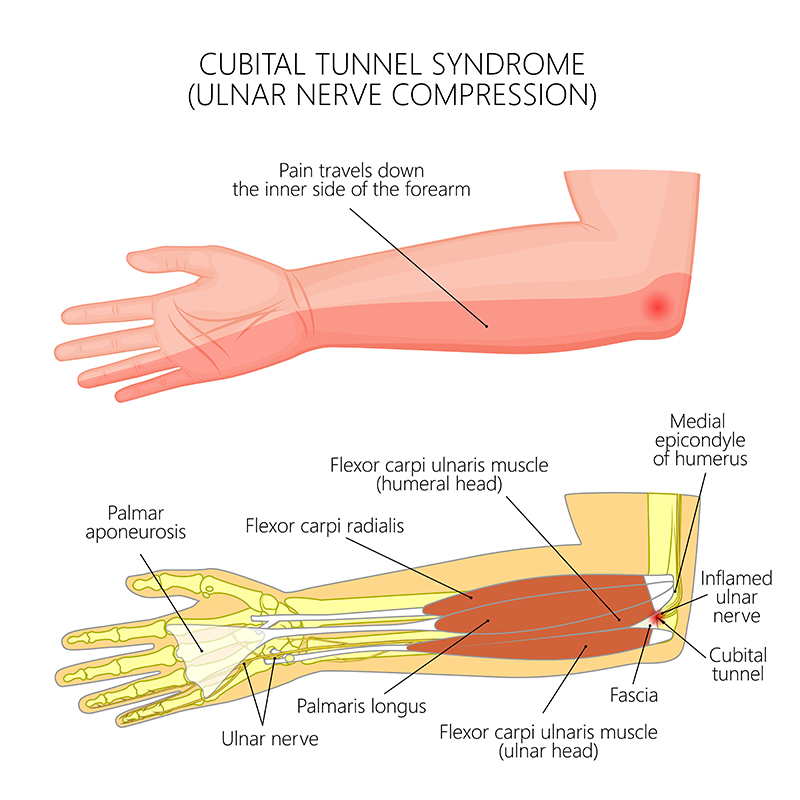
Symptoms
Symptoms can occur if the elbow is kept in a flexed position or by direct pressure on the inner side of the elbow.
- Hand numbness.
- Weakness of the hand.
- Pain around the elbow.
Nonsurgical Treatment
If you are referred to FORM Ortho for nonsurgical treatment of cubital tunnel syndrome our hand therapists will evaluate and determine what activities cause your symptoms and make modifications to these activities. As part of your treatment, our hand therapists may provide you with nerve gliding and range of motion exercise programs, fitting for a padded elbow sleeve, or a custom splint to wear at night.
Post-Surgical Treatment
Should you need surgery, our hand therapists play an important role in your recovery and rehabilitation following cubital tunnel surgery. Our hand therapists design individualized programs for post-surgical therapy based on your operation and your surgeon’s recommendations. Activity modification is a big part of rehabilitation to prevent the recurrence of symptoms.
What Is Cubital Tunnel Syndrome?
Arthritis
Arthritis can affect any joint in the body and can be painful and debilitating when it affects the hands and fingers. Osteoarthritis (OA) and Rheumatoid Arthritis (RA) can cause joint pain, physical abnormality, and dysfunction of the hands and wrists. At FORM Ortho, our hand therapists can help strengthen the joints in the wrists and fingers and improve hand dexterity. In addition to improving hand function, our hand therapists can help decrease the progression of these conditions.
The following are just a few arthritic conditions we treat. If you have a question about whether your condition should be treated by one of our hand therapists, call FORM Ortho at (510) 585-2535 or ask your doctor for a referral to FORM Ortho. If you are not currently under the care of a physician for your condition or would like to be evaluated by an Orthopedic Surgeon specializing in hand, wrist and elbow conditions, schedule an appointment at FORM Ortho.
- Thumb Arthritis
- Rheumatoid Arthritis of the Hand and Wrist
Thumb Arthritis
The thumb base is a common joint to be affected by arthritis. When the cartilage between the two main bones that comprise the thumb joint degenerates over time, bone on bone contact occurs with activity. Due to the lack of cushion from the cartilage, you may experience pain.
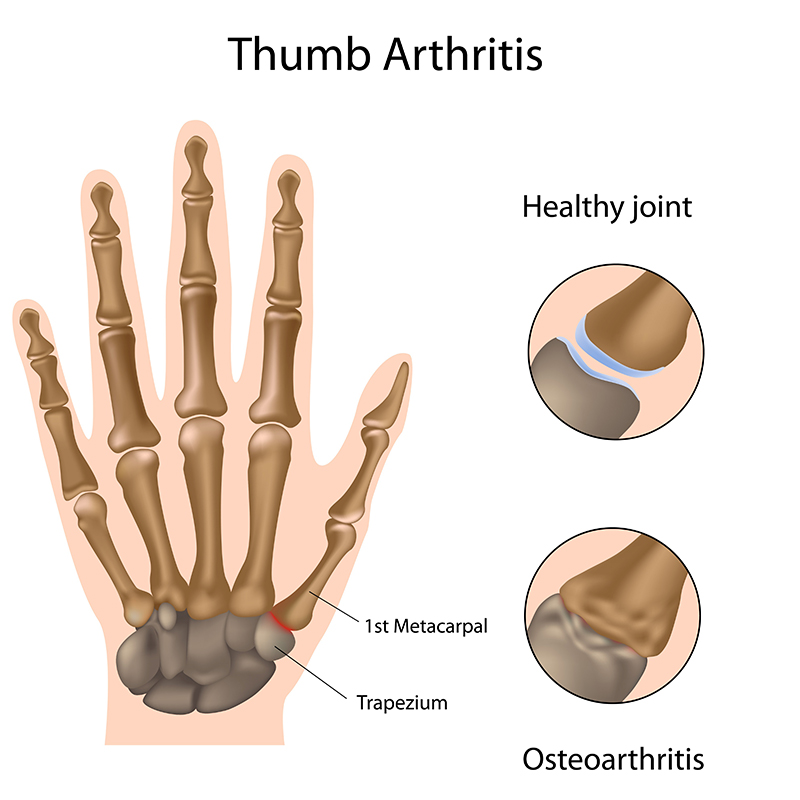
Symptoms
- Thumb pain.
- Thumb achiness at rest.
- Sharp pain with grasping or pinching.
- The thumb joint may even become enlarged.
Nonsurgical Treatment
If you are referred to FORM Ortho for mild thumb arthritis, our hand therapists can provide activity modification, recommend adaptive equipment and exercises to reduce pain, and custom fabricated orthosis. If symptoms persist and begin to limit hand function, your physician may recommend surgery.
Post-Surgical Treatment
Because of the variability of surgical techniques for thumb arthritis, our hand therapists will work closely with your surgeon to determine the period of post-surgical immobilization with a splint. Our hand therapists construct custom splints to ensure that your individual splint will work best for you, and will be easy to take on and off. Rehabilitative goals following surgery will focus specifically on joint healing and regaining hand function.
Rheumatoid Arthritis of the Hand and Wrist
It is estimated that hands and wrists are affected in 80 to 90 percent of rheumatoid arthritis patients. Rheumatoid arthritis is an autoimmune disorder where your immune system mistakenly attacks your own body’s tissues. It affects the lining of your joints, causing a painful swelling that can eventually result in bone erosion and joint deformity.
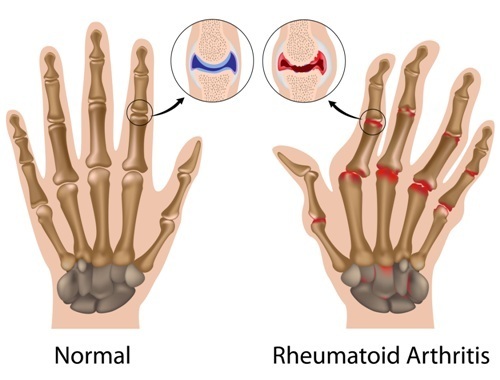
Symptoms
- Hand and wrist joint pain and stiffness.
- Loss of range of motion of the hand and wrist.
- Reduction in hand strength and grip from muscle atrophy.
- Hand and wrist swelling.
- Hand and wrist deformity.
Treatment
For individuals with rheumatoid arthritis, hand therapy is imperative to decrease potential long-term impairment. Loss of hand strength and mobility can be devastating for those with rheumatoid arthritis. Hand therapists play an important role in rheumatoid arthritis treatment by implementing rehabilitative techniques including exercise routines to help maintain range of motion and strength, activity modification, therapeutic modalities such as heat/cold or electrical stimulation, custom splinting, adaptive equipment, and appropriate duration of rest.
What Is Rheumatoid Arthritis?
Tendonitis
Biceps Tendonitis, Lateral Epicondylitis (Tennis Elbow), Medial Epicondylitis (Golfer’s Elbow), De Quervain’s tenosynovitis, and Trigger Finger are among the most common repetitive motion and overuse conditions. These conditions may be treated nonsurgically with splints, exercises, and modification of activities, but sometimes require surgery and post-surgical therapy. At FORM Ortho, our hand therapists have extensive education and training in the rehabilitation of tendon repetitive injuries and tendon overuse conditions.
The following are just a few tendon overuse and repetitive use conditions we treat. If you have a question about whether your condition should be treated by one of our hand therapists, call FORM Ortho at (510) 585-2535 or ask your doctor for a referral to FORM Ortho. If you are not currently under the care of a physician for your condition or would like to be evaluated by an Orthopedic Surgeon specializing in hand, wrist and elbow conditions, schedule an appointment at FORM Ortho.
- Biceps Tendonitis
- De Quervain’s Tenosynovitis
- Trigger Finger
Biceps Tendonitis
The biceps muscle is located at the front of your upper arm with its main tendon attached to the front of the shoulder. Biceps tendonitis occurs when this tendon becomes inflamed from irritation that can be due to normal wear and tear, prolonged repetitive movements, or related to other shoulder conditions such as arthritis, shoulder impingement, chronic dislocation/instability, and cartilage tears. If inflammation of the tendon continues, it can cause the tendon covering (tendon sheath) to become thicker or cause the tendon to tear.
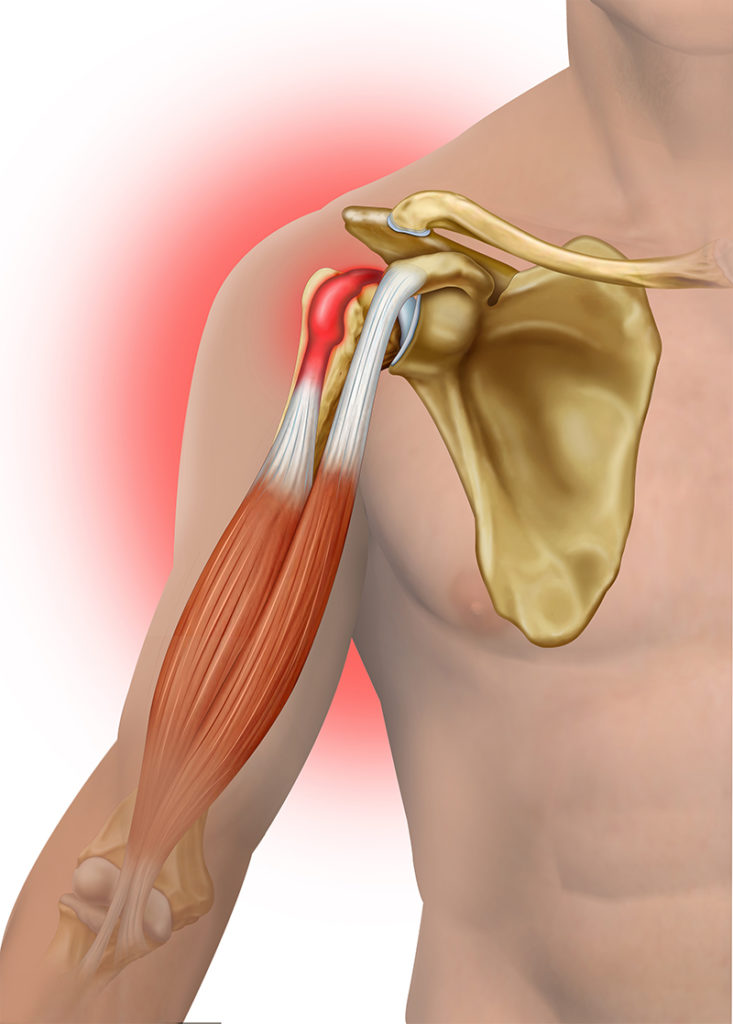
Symptoms
- Pain in the front of the shoulder.
- Shoulder tenderness to touch.
- Worsening pain and/or muscle weakness with overhead or lifting movements.
- Clicking sound or sensation with shoulder movement.
- Radiating pain to the elbow or towards the neck.
Treatment
Biceps tendonitis is usually treated with physical therapy and rarely needs surgical intervention unless there are other shoulder conditions present that require surgery. Once your doctor has determined that your shoulder pain is due to biceps tendonitis and recommends physical therapy as part of your treatment plan, our therapists will design a comprehensive therapy program for you. They will work with you to tailor a program specifically based on the severity of your tendonitis, other shoulder conditions present, and your goals for recovery.
We understand that there are specific activities that are important to you and essential to your day to day duties. Our well-rounded, hands-on approach ensures that you stay motivated and disciplined with your therapy program to get you back to pain-free function. Your therapy program will include strengthening and range-of-motion exercises for balance and support of shoulder muscles, hands-on manual therapy for assisted movement and flexibility, and specific activity training and proper body mechanics to reduce the strain on your shoulder.
De Quervain’s Tenosynovitis
De Quervain’s tenosynovitis is inflammation of the tendons on the thumb side of your wrist that are involved in the extension of the thumb joint. These tendons are usually strained from repetitive motion injury.
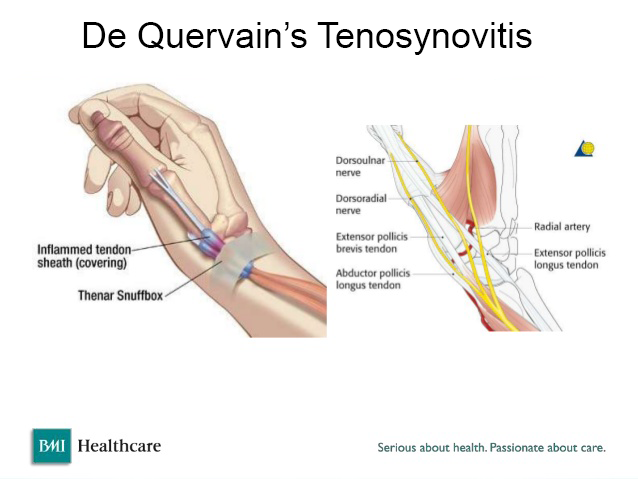
Symptoms
- Pain at the base of your thumb.
- Difficulty moving your thumb or wrist that involves grasping or pinching.
Nonsurgical Treatment
If you are referred to FORM Ortho for conservative treatment of De Quervain’s tenosynovitis, our hand therapists will make modifications to activities that aggravate your symptoms. They will provide an exercise program for stretching and strengthening. They may also create a custom fabricated splint to stabilize the wrist and thumb to assist in resting the tendons in the affected compartment.
Post-Surgical Treatment
If surgery is needed for more severe symptoms, our hand therapists will make every effort to assist in your return to full hand function through a gradual progression of strengthening exercises. These exercises include gentle active range of motion and tendon gliding exercises and then progresses to grip and pinch exercises.
Trigger Finger
Trigger finger is a common condition that affects the tendons that flex the fingers and the thumb. The flexor tendons of your fingers and thumb travel down tunnels guiding them down the digits into the palm. If the tendon becomes inflamed narrowing the space in the tunnel as it tries to glide, the tendon will get trapped, and cause the digit to get stuck in a flexed or occasionally extended position. Symptoms can occur with overactivity of repetitive gripping.
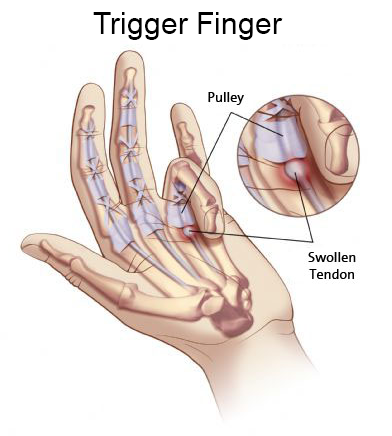
Symptoms
- Stiffness in the finger, especially in the morning.
- A popping or catching sensation.
- Pain with bending the finger.
- Inability to straighten the finger.
- A nodule/lump that is tender in the palm at the base of the affected finger.
Treatment
Your doctor may refer you to a hand therapist for nonsurgical and post-surgical treatment of trigger finger depending on the severity of the condition. For nonsurgical treatment, our hand therapists can fabricate a custom splint to restrict finger movement, teach you exercises to avoid finger stiffness, and modify activities while the finger is healing. The goal of hand therapy following trigger finger surgery is to improve range of motion and regain function of the hand.
Fractures of the Wrist, Hand, and Fingers
The hand and wrist contain many small bones and it is possible to experience a broken hand, wrist or finger and not be aware of it. Fractures are typically a result of trauma and can present as simple and nondisplaced, or they may present as complex fractures that need surgical repair and require post-surgical rehabilitation.
Common fractures include those of the wrist (distal radius and ulna, scaphoid and other carpal fractures) as well as those of the hand (metacarpal) and fingers (phalangeal fractures). At FORM Ortho, our hand therapists are knowledgeable in advanced surgical techniques used and will stay in constant communication with your surgeon to make sure you receive the most comprehensive care throughout your therapy program.
The following are just a few fractures we provide post-surgical rehabilitation for. If you have recently had surgery to your hand, wrist or elbow, ask your doctor for a referral to FORM Ortho. You can print a referral form for your doctor to fill out or contact our office for additional information at (510) 585-2535.
- Distal Radius Fracture (Wrist)
- Finger (Phalangeal) Fractures
Distal Radius Fracture (Wrist)
One of the most common wrist fractures is a distal radius fracture. The radius is the larger of the two bones of the forearm. A fracture of the distal radius occurs when the area of the radius near the wrist breaks, usually from a fall on an outstretched hand. There are many different types of radial fractures that occur and it is important to classify the type of fracture because some fractures can be more difficult to treat than others. Some fractures can be treated nonsurgically (closed reduction) and needing only a splint or cast, or surgically treated (open reduction).
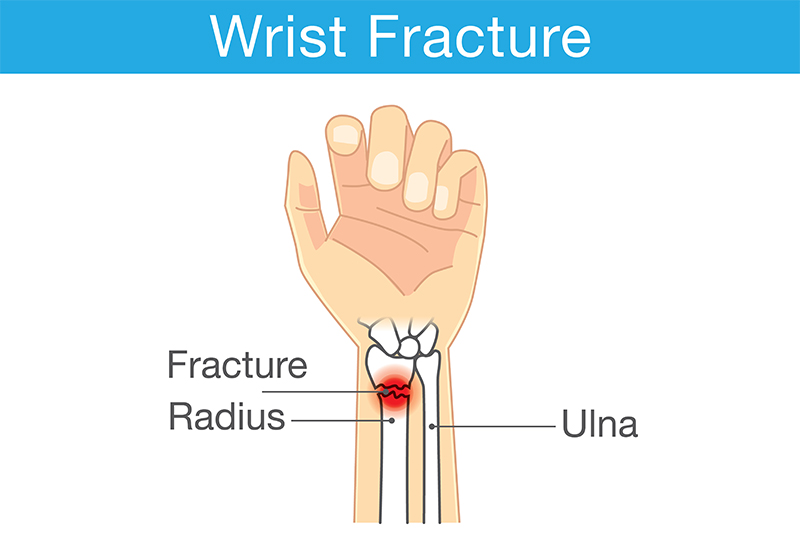
At FORM Ortho, our hand therapists will work closely with your surgeon to determine the right time to initiate therapy and depending on the severity of the fracture, treatment, and level of functioning of the affected arm, your therapist will customize a progressive exercise plan for you to regain range of motion, strength, and restore function.
Finger (Phalangeal) Fractures
Stabilizing a finger (phalangeal) fracture is crucial for the initiation of early and effective rehabilitative exercises to restore finger joint function. Your therapy plan will depend on where the fracture is located along the finger, the type and severity of the fracture, and if surgery was needed for repair. Symptoms of finger fractures include swelling, tenderness or pain, deformity of the finger, and/or difficulty or inability to move a finger.
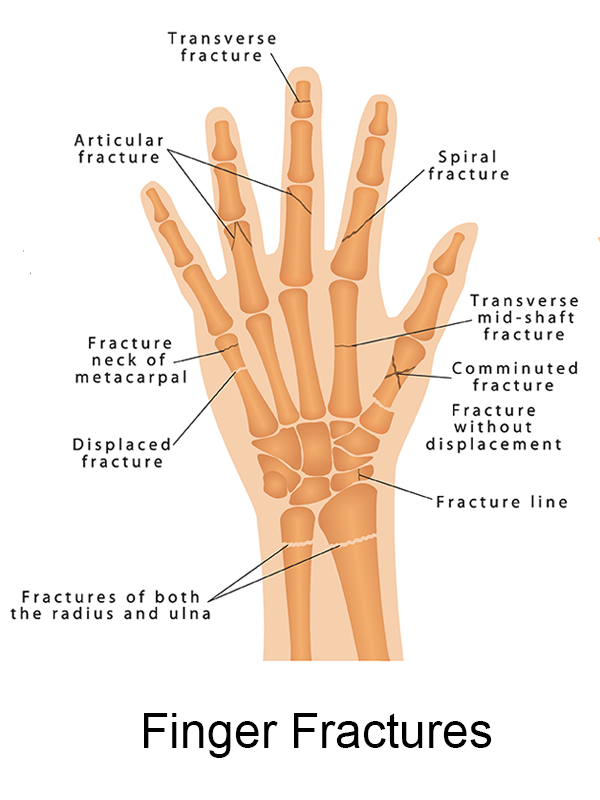
Therapy may include active range of motion exercises, joint blocking exercises, and active tendon gliding exercises in protective blocking splints. Should your finger fracture require surgery, our hand therapists will remain in constant communication with your surgeon to determine your therapy needs to restore range of motion and hand function.
Sprains and Strains
At FORM Ortho, our therapists specialize in the rehabilitation of hand, wrist, elbow and shoulder injuries and surgeries. For injuries that do not require surgery such as mild to moderate strains, sprains, and impingements, it is important to see an occupational or hand therapist. Sprains, strains, and impingements usually occur if there is excessive pressure on a structure or a forceful impact to a structure causing overstretching or partial tears to tendons, ligaments or cartilage. Symptoms may include stiffness, pain, swelling, bruising, and/or loss of strength or stability at the affected structure.
Our hand therapists can fabricate a custom splint to protect the injured structure during healing, and initiate exercises when appropriate to prevent joint stiffness and regain hand or wrist function. Some of the hand and wrist injuries that are treated at FORM Ortho include:
- Wrist Sprain – injury to ligaments that stabilize the carpal bones of the wrist.
- Thumb Sprain (Gamekeeper’s Thumb) – overextending the ligament at the inner side base of the thumb.
- Finger Sprain – impact to a finger that causes injury to tendons of the finger.
- Triangular Fibrocartilage Complex Injury/Instability – injury to the complex of ligaments and cartilage that stabilizes the bones at the wrist (carpal bones, ulna, and radius).
- Volar Plate Injury (“jammed finger”) – hyperextension of a finger on the palm side of the middle phalanx causing injury to the tendon.
- Mallet Finger (Baseball Finger) – direct fingertip trauma can damage the tendon that extends the fingertip losing the ability to straighten the finger at that joint.
The shoulder joint is one of the most mobile joints in the human body, and occupational therapy is the most important treatment for conditions like shoulder impingement and rotator cuff tears. Our occupational therapists not only understand the importance of regaining shoulder range-of-motion and strength but the treatment that is focused on specific skills you need for the demands of your everyday living and working. Our unique and comprehensive approach to therapy combines exercises, manual therapy techniques, physical agent modalities, electrotherapeutic modalities, task analysis, activity modifications, and education of proper shoulder mechanics to gain a successful return to activity without further injury.
Shoulder Impingement
Shoulder Impingement occurs when the bone on top of the shoulder (acromion) puts excessive pressure on the rotator cuff tendons or bursa (cartilage) beneath it causing shoulder irritation and pain. The compression or “impingement” can be due to chronic and repetitive overhead movements, shoulder injury, arthritis, bone abnormalities, or adhesive capsulitis (frozen shoulder). This impingement can then further cause rotator cuff tendonitis and tears, and bursa inflammation and scarring.
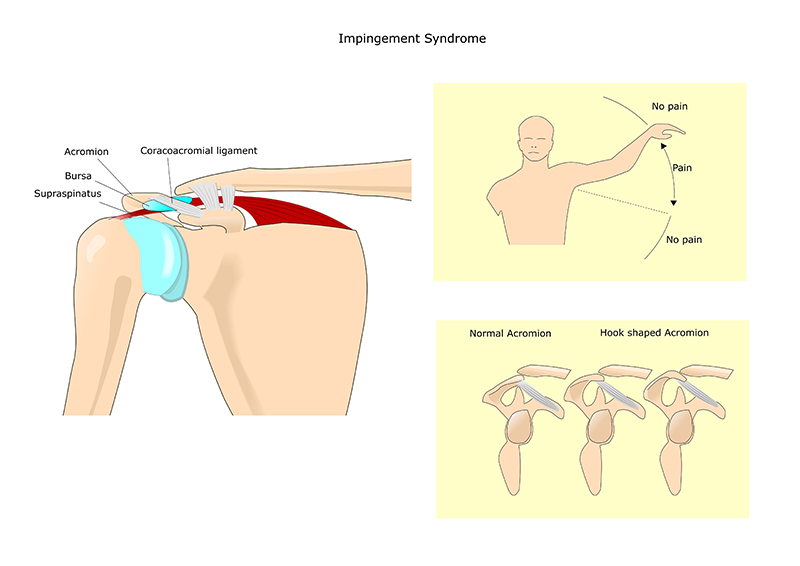
Symptoms
- Shoulder pain with activity such as overhead arm movements, throwing, and side movement.
- Shoulder pain at rest.
- Pain that radiates from the front of the shoulder to the side of the arm.
- Pain at night when attempting to sleep on the affected side.
- Limited range of motion due to weakness.
Treatment
Physicians frequently recommend nonsurgical treatment for shoulder impingement. Research has shown that patients who have actively participated in therapy as first-line treatment for shoulder impingement are able to avoid surgery and have similar outcomes to those who had decompression surgery.
Our occupational therapists have advanced knowledge in the complex arrangement of structures of the shoulder joint, and the contribution of these structures to shoulder movement and stability. Our highly skilled therapists will manage your pain by identifying what movements cause pain and make modifications to activities to reduce impingement.
The therapists may use therapeutic modalities such as iontophoresis or ultrasound to reduce pain. Depending on the level of your impingement, they will determine what range-of-motion and strengthening exercises to progress you through, and employ hands-on manual therapy techniques for proper shoulder movement to avoid impingement. Most importantly, they will educate you on proper shoulder mechanics to assist you in returning to a pain-free function.
If you have had decompression surgery for shoulder impingement, therapeutic rehabilitation is absolutely necessary to regain range-of-motion and strength. Our therapists will collaborate with your surgeon to progress you through a rehabilitative program based on clinical criteria and time frames appropriate to you and your specific surgery.
If you have recently suffered an injury to your hand, wrist, elbow or shoulder, ask your doctor for a referral to FORM Ortho. You can print a referral form for your doctor to fill out or contact our office for additional information at (510) 585-2535. If you are not currently under the care of a physician for your condition or would like to be evaluated by an Orthopaedic Surgeon specializing in hand, wrist and elbow conditions, schedule an appointment at FORM Ortho.
Trauma and Laceration Repair
We understand that having gone through hand, wrist, elbow or shoulder surgery, you expect to be done with dealing with your injury or condition, but the results of your surgery can sometimes rely on the therapy you receive following surgery. Physical therapy is essential for patients who have had surgery of the hand, wrist, elbow, and shoulder. When you choose FORM Ortho, you can trust that you are receiving the highest standard of care in occupational and hand therapy.
For the benefit of our patients, our therapists strive to remain at the forefront of rehabilitative interventions and knowledgeable about advanced surgical techniques being used. Due to variability between types of surgical repairs, our therapists will design your therapy program specifically to you and your surgery. We are dedicated to our patients and will keep you motivated throughout your therapy program.
Our therapists meticulously progress you through a therapy program that is focused on the protection of healing structures and regaining functionality. We offer a wide range of therapeutic services and regularly communicate with your surgeon to ensure maximal recovery. Our therapists are highly experienced in the rehabilitation of simple to complex surgical repairs including:
- Extensor/Flexor Tendon repair
- Nerve laceration repair
- Traumatic amputations
- Crush injuries
- Triangular Fibrocartilage Complex Cartilage (TFCC) repair
- Nerve Compression release
- Fracture repair
- Joint replacement/fusion
- Ligament tear repair
- Dupuytren’s Contracture removal
- Rotator Cuff tear repair
- Cartilage tear repair
If you have recently had surgery to your hand, wrist, elbow or shoulder, ask your doctor for a referral to FORM Ortho. You can print a referral form for your doctor to fill out or contact our office for additional information at (510) 585-2535.
